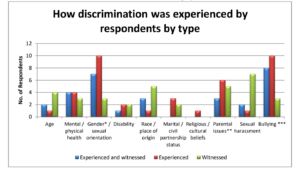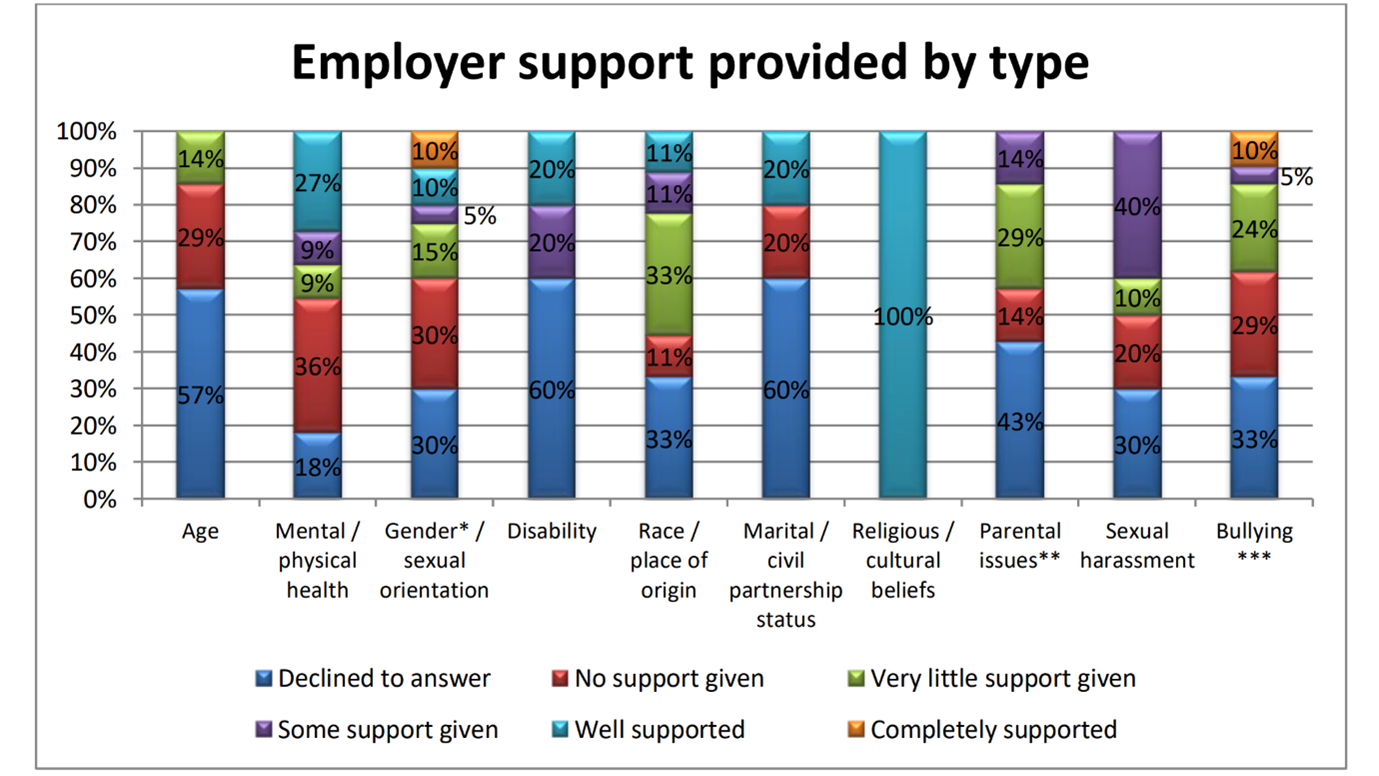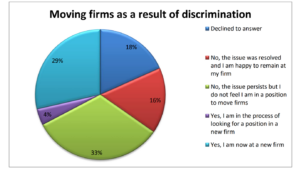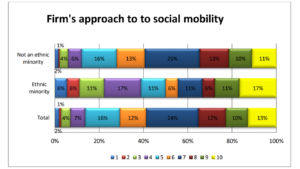In this guest post, Fellows and Associates’ Head of Social Media, Carys Bello, shares some of the key findings from the 2023 survey. You can read the full report here.
I hold hope that our analysis of the results will reveal significant progress in addressing workplace issues related to discrimination. Regrettably, when comparing the current survey data to the previous year’s findings, we observe minimal change. Despite the commendable efforts of organisations like IP Inclusive, which actively promote awareness through discussions and workshops, there appears to have been limited improvement in individuals’ perception of these crucial matters within the industry.
Experiences of discrimination
The information provided in the survey results sheds light on the prevalence of discrimination within the IP professions. A significant portion of respondents (approximately 42%) reported experiencing multiple types of discrimination, either directed at themselves or others. This figure has shown a decrease from previous years, with 52% in 2022 and 63% in 2021, suggesting a possible improvement in addressing discriminatory practices within the industry.

Furthermore, the survey highlights the diversity within the IP professions. Of those experiencing discrimination, 5% identified as being from an ethnic minority background, indicating that individuals from diverse racial and ethnic backgrounds face discriminatory challenges within the workplace.
The survey also provides insights into gender representation within the IP professions. According to the data, 56% of respondents experiencing discrimination were female, suggesting that gender discrimination continues to be a concern in the industry. Additionally, 2% of those experiencing discrimination identified as non-binary, signalling the need for increased inclusivity and support for individuals with diverse gender identities.
Overall, the survey data reveals that while progress has been made in addressing discrimination within the IP professions, areas still require attention and improvement. The findings underscore the importance of promoting diversity, equity and inclusion initiatives to create a more inclusive and respectful work environment for all professionals in the field of intellectual property.
Employer support
We asked if respondents felt they had been positively supported by their employer when they had experienced and were negatively impacted by discrimination, bullying or harassment.

Respondents were invited to comment on the support they received from their employers and whilst only 25% did, there was a single theme from the overwhelming majority – that HR and management were perceived as either ineffectual or unsupportive or, worse, as actively participating in the discrimination and/or bullying.
The implications for employers

The data summarised in the pie chart above, about respondents moving firms as a result of the discrimination they had experienced, reinforces the vital importance for IP firms to adopt a proactive stance in tackling these issues and fostering a workplace that is both supportive and inclusive. This necessitates strengthening HR policies and practices, implementing robust anti-discrimination and anti-bullying measures, and nurturing a culture of open communication and mutual respect.
Social mobility in the IP sector
The survey results on social mobility within the IP professions provide valuable insights into how firms approach hiring candidates from diverse backgrounds. Our scoring system, ranging from 1 (very poor approach) to 10 (well-defined and executed approach), yielded a weighted-average score from all respondents of 6.74.

This suggests that there is room for improvement in fostering social mobility within the industry.
The data also highlights a disparity in perceptions between ethnic minorities and non-ethnic minorities. Ethnic minorities gave an average score of 5.94, while non-ethnic minorities gave an average score of 6.76. This indicates that there may be varying experiences and opportunities for candidates from different demographic backgrounds.
Respondents’ comments further shed light on the approaches taken by firms in relation to social mobility. The comments can be categorised into three distinct camps with equal frequency:
- Some firms make little to no effort to attract socially diverse candidates, suggesting a lack of proactive measures to enhance social mobility.
- Other firms face challenges in considering social mobility when there are limited applicants from diverse backgrounds or when candidates all belong to the same demographic. This may indicate the need for increased outreach and recruitment efforts to attract a broader range of candidates.
- Conversely, some firms demonstrate a proactive approach to attracting candidates from diverse backgrounds and have structured strategies in place to enhance social mobility.
Overall, the information provides valuable feedback on the current state of social mobility within the IP professions. It underscores the importance of fostering a more inclusive hiring environment and implementing targeted efforts to attract candidates from diverse backgrounds, ultimately promoting a more diverse and representative workforce.
Our conclusions
In essence, we believe the feedback from respondents emphasises the pressing need for transformative change within the IP professions. By proactively tackling the raised concerns and making employee wellbeing and inclusivity a top priority, firms have the opportunity to cultivate a healthier and fairer work environment for all individuals in the realm of intellectual property.
Every year, our objective is to present our findings and offer an unbiased perspective. My hope is that over time, this section of the report will become obsolete. However, for now, it is evident that there is still progress to be made, and initiatives like IP Inclusive remain crucial.
Carys Bello
Head of Social Media
Fellows and Associates
 The much-anticipated annual Fellows and Associates 2023 Salary Survey has been officially released, offering a comprehensive glimpse into the world of compensation and workplace dynamics. This year’s survey leaves no stone unturned as it ventures into crucial yet often overlooked aspects, shedding light on issues of discrimination, sexual harassment and mental health within work environments. By examining these critical areas, the survey aims to initiate a deeper conversation about the challenges faced by employees in various industries. With the full survey results now accessible at www.fellowssurveyresults.com, professionals and employers alike are eager to explore the latest findings and glean insights into the changing landscape of workplace practices.
The much-anticipated annual Fellows and Associates 2023 Salary Survey has been officially released, offering a comprehensive glimpse into the world of compensation and workplace dynamics. This year’s survey leaves no stone unturned as it ventures into crucial yet often overlooked aspects, shedding light on issues of discrimination, sexual harassment and mental health within work environments. By examining these critical areas, the survey aims to initiate a deeper conversation about the challenges faced by employees in various industries. With the full survey results now accessible at www.fellowssurveyresults.com, professionals and employers alike are eager to explore the latest findings and glean insights into the changing landscape of workplace practices.


